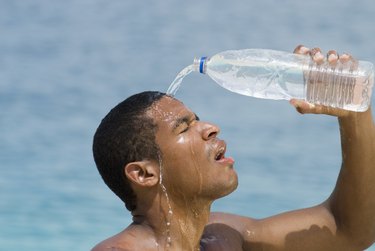
If you have an email account, you've almost certainly received at least one dire warning about the dangers of reusing plastic water bottles or leaving them out in the sun and then reusing them. While plastic bottles do have risks -- they clog up landfills, for one thing -- the stories spread about their cancer-causing effects are not true. Leaving a case of water bottles in the sun will not cause dangerous chemicals to break down in the water, although heat can affect the integrity of the bottle and change the taste of the water.
Components
Video of the Day
Water bottles made for one-time use contain polyethylene terephthalate, also known as PET. You can tell if a bottle contain PET because it has a number one surrounded by a triangle on the bottom of the container. Water bottles made from PET do not contain di(2-ethylhexyl) adipate, or DEHA, one of the components that critics of the plastic bottles claim leach into the water. None of the United States regulatory agents classify DEHA as a cancer-causing agent, according to the American Cancer Society. Plastic bottles also do not contain dioxin, a potential cancer-causing agent blamed for the death of women from breast cancer in email warnings on plastic water bottles, Snope.com reports.
Video of the Day
Chemical Breakdown
Plastic water bottles are soft and don't last as long as bottles containing more durable plastics. Substances in the bottles will leach out into the water, especially if you leave the water-filled bottles in the sun. However, while leaving the bottle in the sun may change the color, taste or smell of the water, it won't cause dangerous chemicals to leach into the water, the Centre for Food Safety in Hong Kong states. Plastic bottles made from PET will leach very small amounts of antimony, a heavy metal, in amounts below the World Health Organization's level for safe drinking water.
Bacteria Growth
A legitimate risk about reusing water bottle or drinking it after it's been sitting around for a few days stems from the possibility of bacterial growth in the bottle. If you haven't opened the bottles yet, the inside of the bottle hasn't been contaminated. If you do reuse the bottles, wash them thoroughly to avoid bacteria introduced into the bottle from multiplying.
Considerations
Plastic bottles made from bisphenol A, a harder plastic used to make baby bottles and other containers, can leach BPA into the water when heated, numerous studies including one conducted by Health Canada and reported in the June 2009 issue of " Food Additives and Contaminants." For this reason, most manufacturers have removed bottles made with BPA, designated by the number seven on the bottom of the bottle, from the marketplace. If you have a water bottle made with BPA, leaving it out in the sun could increase the amounts of BPA, a chemical known as an environmental estrogen because it has similar effects as sex hormones such as estrogen.
- American Cancer Society: Plastic Water Bottles
- American Chemistry Council: FAQs: The Safety of Plastic Beverage Bottles
- "Food Additives and Contaminants"; Migration of Bisphenol A from Plastic Baby Bottles, Baby Bottle Liners and Reusable Polycarbonate Drinking Bottles; C. Kubwabo, et al.; June 2009
- Centre for Food Safety; Reusing Disposable PET Bottles; May 2011
- Snopes.com; Bottle Royale; April 2009